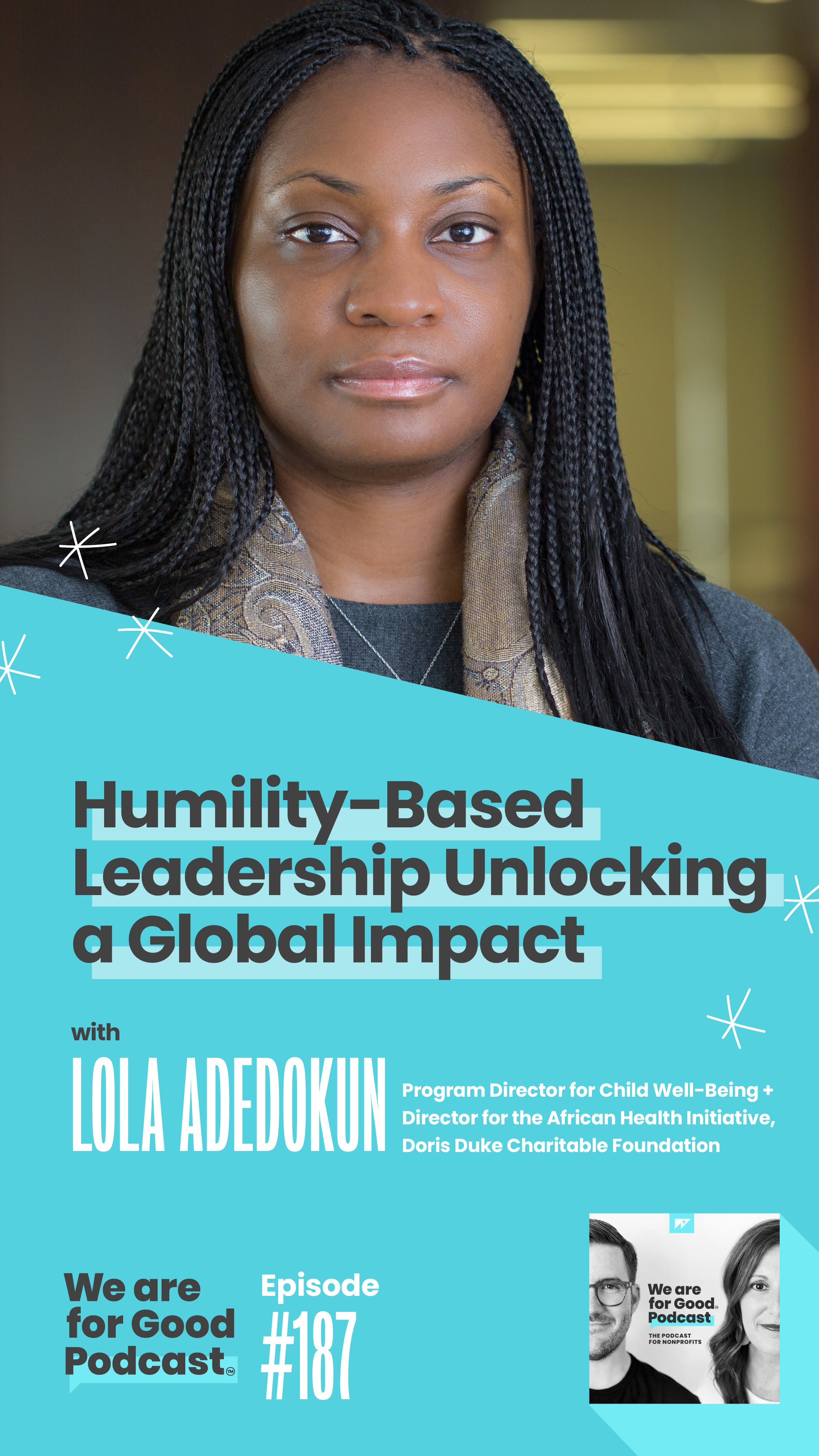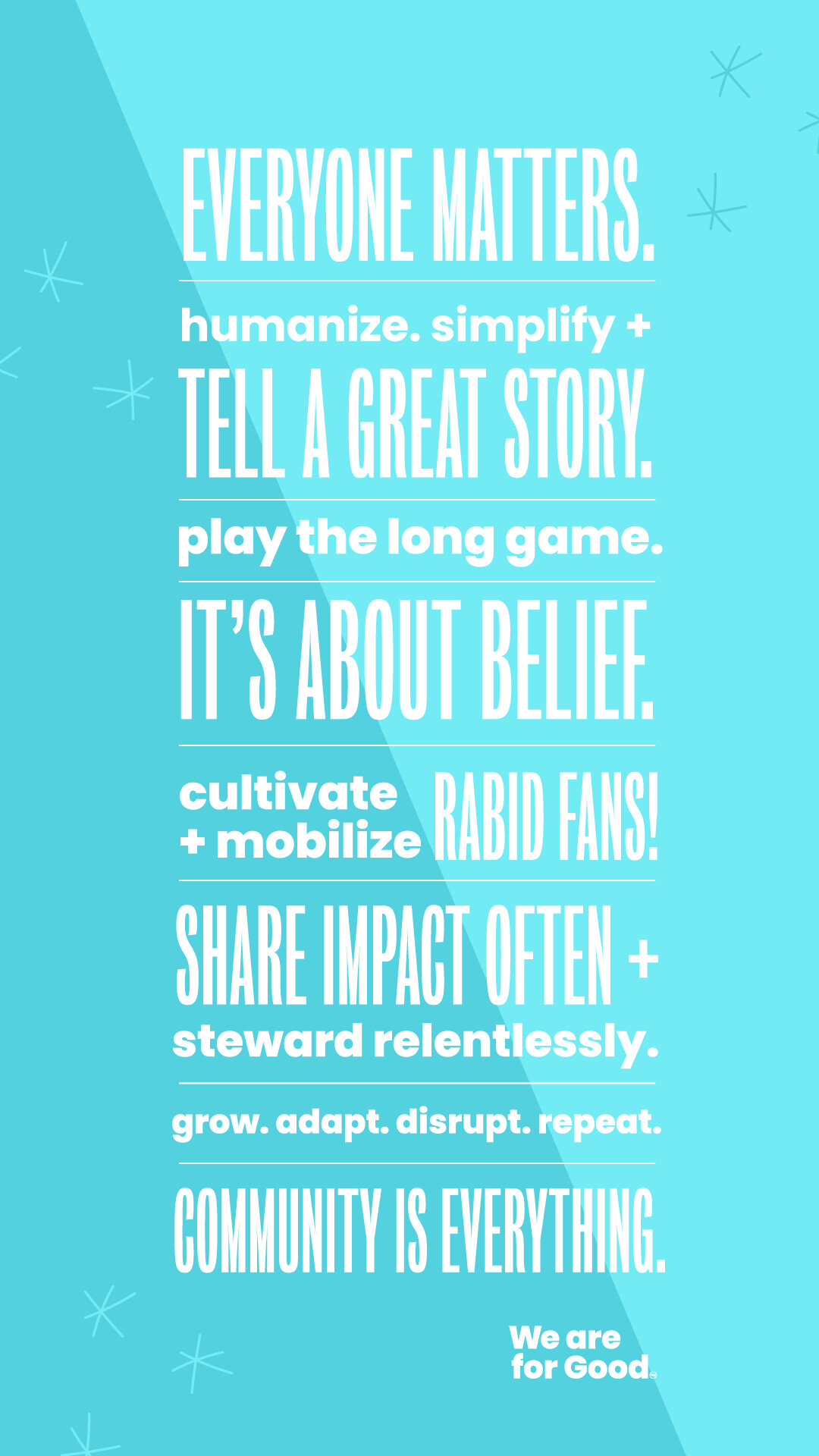187. Humility-Based Leadership Unlocking a Global Impact - Lola Adedokun
Listen to this episode
Overview
Meet Lola. She's the director of the African Health Institute and the Program Director for Child Well-Being at the Doris Duke Charitable Foundation. She is a powerhouse of ideas, experiences, and knowledge with a passion for closing the inequitable gaps we are all too aware of in our communities and across Africa. Today's chat centers on data, humility, and listening. We're also talking through leadership in this new era and making data-driven decisions for good.
Today’s Guest
Lola Adedokun, Program Director for Child Well-Being and Director for the African Health Initiative
“What I hope to sort of make clear as solutions, I believe, have to be holistic. If we want to have enduring solutions that really bleed into conversations around systems transformation, we can call it build back better, but just looking at a decade of the decade ahead of us, how we will be different and transformed. We have to take a holistic approach.”
Episode Transcript
Download Full Episode Transcript Here
Episode highlights
Lola’s story and journey to where she is today (2:00)
An overview of programs Lola works with at Doris Duke Charitable Foundation and their impact (3:50)
New pathways to leadership (particularly for leaders of color, young people, and community organizers!) (13:00)
Making data-driven decisions (15:00)
An example of leveraging data for deeper impact (20:00)
How nonprofit leaders can use their voice to partner with policymakers to advocate for systems that are adaptive, learning and are built to respond quickly to the needs of the people it is meant to serve (26:00)
Meeting the moment today (28:00)
A powerful moment of philanthropy in Lola’s life (34:00)
Lola’s One Good Thing: Have a great glass of water and take a walk outside. (37:00)
Powerful quotes
“Forever there has been talent and ability and creativity on the continent. But the myth of Africa has gotten in the way of others really understanding that, and recognizing the possibility. So part of the work, part of my learning has been really leaning with humility, knowing, and assuming there is strength, and brilliance, and just finding ways to create pathways for those brilliant people to do their work to do their work in a way that is safe, that honors their vision and culture has been really my guiding, Guiding Light.” -Lola
“We have to look beyond our borders, to seek the best and brightest. And many of the best and brightest are in one of the largest continents in the world. We forget that.” -Lola
“I have been privileged to be able to see that because of my work. And so to begin to bridge those connections, one human to another human, rather than one problem to another problem, which is often how we tackle issues. So I'm just really, really honored to be able to build those bridges, and let people thrive.” -Lola
“In Africa, we have invested in what we are calling, building and strengthening learning health system. So that's building a culture of drawing on data research and evidence by practitioners by policymakers and community leader to create policies and programs that worked for them that work locally for them.” -Lola
“It sounds complex, but really all it is, is giving space and time for people to problem solve together. We've funded and financed the space and time for all of these parties - policymakers, practitioners, frontline workers, community health workers, and parents - to come together and problem solved, and then hold themselves accountable through sort of 14 Accountability Report backs.” -Lola
“In addition to building this learning culture, because our systems are imperfect as well, and they also are under resourced and under supported to really reflect and think and be more creative. So we're helping to create those spaces.” -Lola
“What I hope to sort of make clear as solutions, I believe, have to be holistic. If we want to have enduring solutions that really bleed into conversations around systems transformation, we can call it build back better, but just looking at a decade of the decade ahead of us, how we will be different and transformed. We have to take a holistic approach.” -Lola
“We all have a role to play in mentoring in your community, and your network that's beyond that, we have a responsibility to mentor and support younger people, and bring them in and be honest about our experiences with them.” -Lola
“So we have to put our dollars, put our money, where our mouth is. If you believe in humans and you believe in people, you need to create the space for them to live their authentic lives.” -Lola
“Before going into a community, before making a decision about what we will do, I lean into the data, that's how we decide where our resources will go, data, administrative data, census data, and also the the kind of community based participatory research, which enables you to understand what the community's needs are.” -Lola
“These organic networks are being developed amongst communities of color, because that's an authentic way in which a lot of leaders of color work we are in this together.” -Lola
“I have to give credit to my other philanthropic colleagues in the room who made similar investments. It's not about one foundation, and not how big their endowment is, it's about the entire industry and how we work together.” -Lola
“Wherever we go, when we're making an investment, we invite different leaders to join the table.” -Lola
“It's an African technique, we introduce ourselves, and then we talk about our approach and ask if they're willing to do it with us, will you join us and being transparent, being honest and listening to one another as we create solutions.” -Lola
“The point is, you will fail. But your segments to look upon that failure, adapt and proceed. You know, adapt your model adapt your approach, but failure is part of it.” -Lola
“Say their name if you see a leader. We all have that power.” -Lola
Connect with lola
Connect with doris duke foundation
Website / LinkedIn / Twitter / Facebook
Rate, Review, & Follow on Apple Podcasts
Are you a fan of the We Are For Good Podcast? Please consider rating and reviewing our show! This helps us serve more do-gooders — just like you — grow their own impact uprising.
First time doing reviewing a podcast? Don’t sweat - it’s super easy! Click here, scroll to the bottom, tap to rate the show with stars, and then click “Write a Review.” We’d love to hear what you loved most about this episode!
While you’re there, if you haven’t done so already, would you consider subscribing to the podcast? We curate inspiring conversations weekly to help you do more for your mission (and the occasional surprise minisode too!) and if you’re not subscribed, you could totally out. Subscribe now!
Join the Good Community!
The We are for good community
This is a safe place for deeper conversations. While we love this podcast, it is a very one-sided dialogue. It is great for starting conversations, but not continuing them. You can find friends, colleagues, and others to champion alongside. We believe community is everything and we wanted to create a place where people could learn and thrive and grow together (and also have a whole lot of fun).












